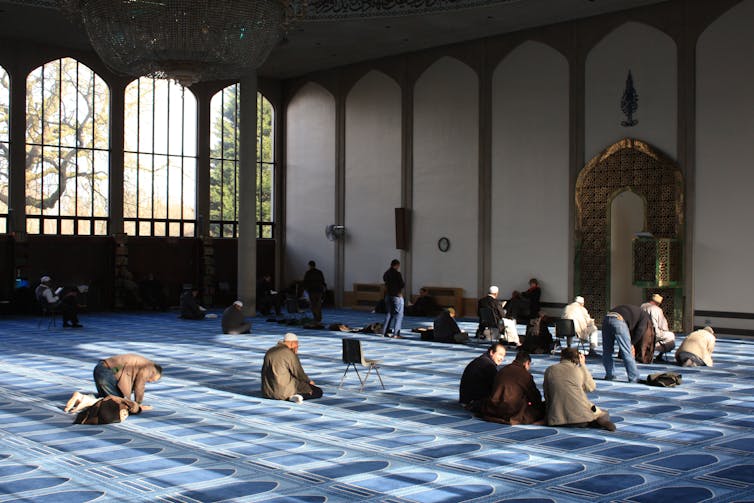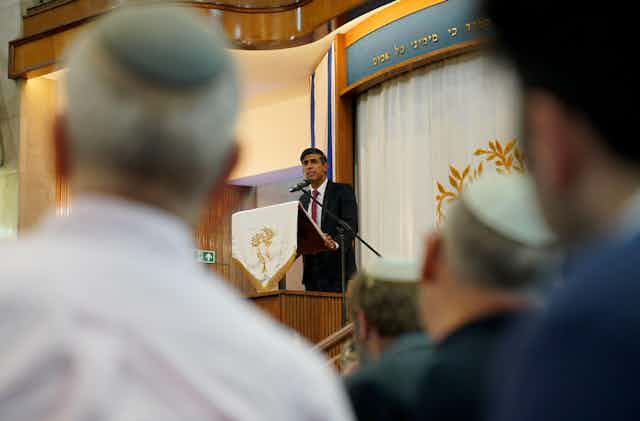The future of the UK’s Inter Faith Network (IFN), a long-standing charity that promotes dialogue and cooperation between Britain’s religious groups, is in doubt after the government announced it was withdrawing funding for the group. Communities secretary Michael Gove has cited concerns that a member of the Muslim Council of Britain (MCB), with which the government has suspended cooperation since 2009, has been appointed an IFN trustee.
In response to Gove’s letter, the IFN has said it had never been advised “to expel the MCB from membership”. It also said that while the government might choose not to engage with the MCB, doing so “is not a sensible option open to the IFN if it is to achieve the purposes for which the government funds it in the first place”.
Founded in 1987, the IFN represents Baha’i, Buddhist, Christian, Hindu, Jain, Jewish, Muslim, Sikh and Zoroastrian faith groups. In the charity’s 37-year history, religious pluralism in the UK has grown exponentially – and is still growing despite an overall decline in religiosity.
This underlines the importance of the interfaith dialogue the charity exists to promote. Indeed, the government-commissioned Bloom review of England’s growing religious pluralism, published in 2023, made a similar point when examining how the government might best acknowledge the value different faith groups bring to society.

The UK’s increasingly diverse faith landscape
In 2018, the Pew Research Centre published “Being Christian in Western Europe,” a survey of religion in 15 western European countries. The majority of the adults surveyed in 14 of the 15 countries considered themselves “non-practicing Christians”.
The survey found that the UK had roughly three times as many non-practicing Christians (55%) than church-going Christians (18%). It concluded that the notion of Christian identity remains a meaningful religious, political and sociocultural marker.
It also noted that many people have “gradually drifted away from religion, stopped believing in religious teachings, or were alienated by scandals or church positions on social issues.”
The rising number of people who subscribe to no religion belies the fact that the Christian proportion of the population is changing too. In 2023, British journalist Tomiwa Owolade reported on how demographic shifts are reshaping churches across the UK. Between 1980 and 2015, churches saw a 19% rise in attendance by non-white worshippers.
“Without immigration,” he wrote, “the decline of Christianity would be even more profound: it is largely white British people who are abandoning their faith.”

Recent migration from Hong Kong has seen the Chinese Christian community in the UK grow substantially. As of 2023, there are about 115,000 Chinese Christians worshipping at over 200 churches across the UK.
Newly arrived Chinese Christians bring with them a belief in the importance of Bible reading. They are strengthening Church of England congregations in cities including Manchester, Liverpool and Bristol.
This highlights how migrant populations in the UK and more broadly in western Europe wield increasing influence in terms of spirituality and belief. Between 2011 and 2021, the proportion of the population of England and Wales that identifies as Muslim has grown, from 4.8% (2.71 million people) to 6.5% (3.87 million).
Other fast-growing religious groups in the UK include Shamanism, whose followers have increased from 650 people in 2011 to at least 8,000 in 2021. Its emphasis on all things in nature – from people to the environment – being treated with dignity and respect distinctively appeals to the growing number of people in the UK who live with climate anxiety.
How the government engages with faith groups
Until now, UK politicians have largely only engaged with local faith groups in public when it has been politically expedient to do so. A primary motivation has often been to not be criticised by detractors for excluding communities on the basis of religion. This approach is underpinned by an Enlightenment theory of secularism, which sees engaging with issues of religion as unworthy of the looming headaches such engagement might cause.

The 2023 Bloom review, by contrast, calls for government to build constructive relationships with faith groups. “It should be the government’s responsibility,” Bloom writes, “to equip all civil and public servants with the basic factual knowledge to be able to recognise and understand the diverse religious life of the population.”
Appointed in 2019 by Boris Johnson, who was then prime minister, Colin Bloom was commissioned to explore what the government could do to better acknowledge and support the contribution faith groups make to society. He investigated how to better promote shared values and tackle harmful practices and how to promote both freedom of religion and freedom of speech. He also looked at how government officials might improve their faith literacy.
To be faith literate is to understand how belief systems differ and how those distinct from your own shape other people’s attitudes, values and experiences. In a bid to boost equality, Bloom recommends that government workplaces and educational settings adopt the term “faith-sensitive”.
As opposed to the flattening out of difference that a “faith-blind” approach can take, promoting faith-sensitivity encourages people in positions of authority to acknowledge, understand and treat with respect diverse belief systems.
The language the UK government uses on faith-related subjects matters. It models – for everyone living in the UK – how to best engage with diverse manifestations of belief.
I would argue that Bloom’s emphasis on a faith-sensitive government approach does not go far enough. It implies that the government’s priority should be to not cause offense. Even better would be a “faith-positive” approach that actively ascribes value to the contributions faith communities can make to everyday British life.
Back in 2001, the IFN said, “Greater awareness about the faith of others is crucial as we enter the 21st century in the UK because ignorance is a major contributor to prejudice and even to conflict.” Two decades on, the shocking rises in incidents of antisemitism and Islamophobia, in recent months, point to how urgently that remains true.
Early 20th century English writer G.K. Chesterton once affectionately wrote, “Let your religion be less a theory and more a love affair.” He was offering a framework to help British Christians better understand their faith. A similarly faith-positive approach to all of Britain’s belief systems would both recognise and value quite what people of faith can bring to wider British society.

